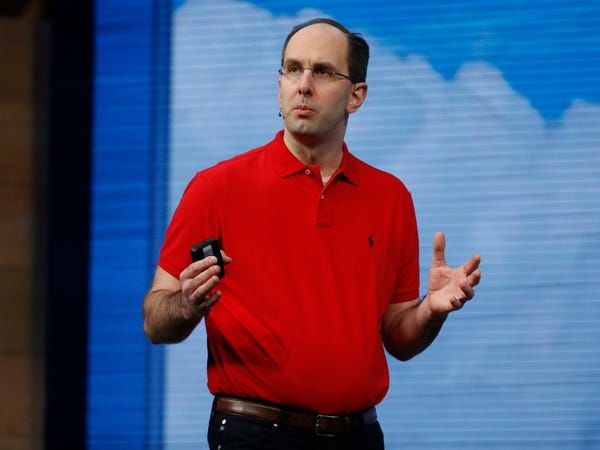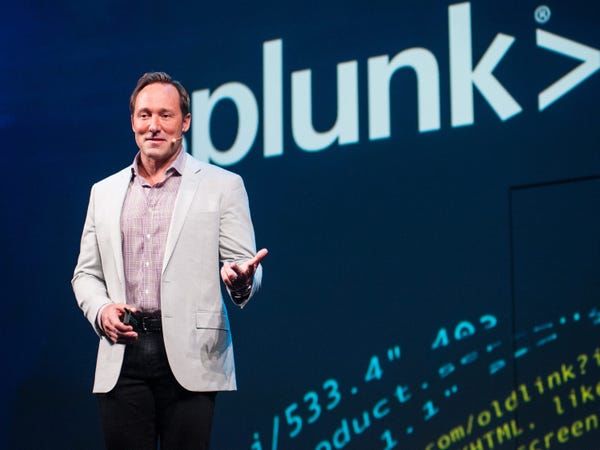
Why software's subscription model is 'dying' and usage-based pricing is the 'next wave' for cloud services
 Zuora CEO Tien Tzuo
Zuora CEO Tien Tzuo
The shift away from buying boxed software to subscriptions was one of the biggest innovations of the cloud era to-date, but there's a new model that's winning converts and disrupting the status quo.
Usage-based pricing, where companies charge customers based on their precise usage — like their per-second compute power consumption or their exact amount of storage — has been gaining steam.
It's a vastly different approach from the software-as-a-service (SaaS) model, popularized in Silicon Valley over the past decade and used by software heavyweights like Adobe, Salesforce, Slack , and Zoom , where companies charge customers per user every month or every year.
Snowflake, Twilio, and Stripe — as well as cloud providers Amazon, Microsoft, and Google — were some of usage-based pricing's pioneers, and companies like Informatica, New Relic, and Splunk are some of its newer adherents.
But as the pandemic-spurred economic downturn squeezed company budgets and customers demanded more billing flexibility, Silicon Valley has seen an uptick in companies transitioning to usage-based pricing. Now, analysts and tech executives say enterprise tech's future is in usage-based pricing.
"I think what the pandemic did was remind people — both the vendors and their customers — that their usage could be highly variable and the licensing model didn't generally reflect it," Gartner analyst John Santoro told Insider.
It's "the only model that made sense," says Christian Kleinerman, senior vice president of product at Snowflake, which has followed a usage-base model since its founding. It gives customers more flexibility regardless of when they experience peak demand and doesn't force them to pay for product features they don't use, he said.
Among the myriad benefits to offering this model are some drawbacks too, including unpredictability, meaning that it's not the best fit for every company. But here's why analysts and executives, including those from Twilio, Microsoft, Stripe, and Snowfl ake, think usage-based pricing is here to stay.
 Snowflake CEO Frank Slootman
Snowflake CEO Frank Slootman
The subscription-based model is 'by and large dying'
Then as cloud software became more popular, many tech companies shifted from a traditional licensing scheme to a subscription-based, pay-as-you-go model, pioneered by companies like Salesforce in the early 2000s. This has become the dominant model for tech firms and has proved wildly successful for years.
But then cloud providers became some of the first companies to charge based on usage of their computing services in a really granular way.
"For every second of compute you're using, you get billed for it," OpenView partner Sanjiv Kalevar told Insider.
For example, Azure cloud charges "pretty much entirely per usage," said Scott Guthrie, Microsoft's head of cloud and AI.
He and other execs say that one of the benefits of the usage-based model is that customers love it.
 Scott Guthrie, Microsoft's executive vice president of cloud and AI,
oversees Azure and was once described by an analyst as a "cloud
visionary."
Scott Guthrie, Microsoft's executive vice president of cloud and AI,
oversees Azure and was once described by an analyst as a "cloud
visionary."
Twilio CFO Khozema Shipchandler went as far as to say that the subscription-based model is now "by and large dying" because usage-based pricing gives customers better deals.
"With a SaaS product, there are a bunch of features out of the box, but if you don't use those features, you pay for them anyway," he said.
Usage-based pricing, meanwhile, is "the next wave" because the vendor is "always on the right side of the customer," he said. It also allows customers to start using new tools without a lot of risk: "You can start off at a very small scale and rapidly scale up as you start to see success," he said.
Usage-based pricing also helps buyers make sure they're getting the most value for their money, according to Tien Tzou, CEO of subscription management company Zuora. In his experience, customers want to pay directly for exactly what they're using, instead of shelling out for features they don't need.
"We want the amount we pay to be commensurate based on the value we get," he said.
If different types of users within a company are using different tools in the software, they don't end up paying for features they don't want or need, he said.
"Basically the balance of power has shifted from vendor to the customer and usage-based pricing is the perfect alignment," OpenView's Kalevar said. "That's why it's a very powerful business model."
Stripe, for instance, has a usage-based pricing model and charges the same rate, no matter what transaction type customers use. Customers appreciate this because they want "predictability in their costs," said Jeanne DeWitt Grosser, head of Americas revenue and growth at Stripe.
"There's very good alignment between pricing and value delivered," Grosser told Insider. "The pro for the product company is it's a model that scales."
Bank of America analysts called Twilio "the most compelling land-and-expand model in the Communications Software universe" because of its usage-based model.

Some companies see usage-based pricing as part of modernizing their business
Informatica, a nearly three-decade old data company, recently pivoted from a subscription model to usage-based pricing as part of a larger modernization push. Describing the company's new cloud-native data management platform, CEO Amit Walia told Insider "we absolutely wanted to marry it with a cloud-native pricing model, which is a consumption-based pricing model."
 Amit Walia, the CEO of data management company Informatica, is going
all-in on cloud by partnering with all three major providers, but also
focusing on hybrid with Microsoft.
Amit Walia, the CEO of data management company Informatica, is going
all-in on cloud by partnering with all three major providers, but also
focusing on hybrid with Microsoft.
"Customers pay as they go," Walia said. "They can grow to any scale they would like to."
Big data company Splunk also went through a usage-based pricing update as it modernized for the cloud in September 2019. Splunk now charges based on cloud workload, which depends on the capacity customers use rather than data volume.
Under Splunk's volume-based model, customers were "nervous about putting data in without mentally, exactly knowing the value that they would get," says Splunk CEO Doug Merritt. The new consumption model has "had a huge impact on the value that they're getting," he said.
This has also had a positive impact on Splunk's business: Its cloud revenue revenue has increased 80% a year after it made the change.
Another reason that usage-based pricing is having a moment is the onslaught of new technology. It's harder to apply a per-user fee to new technologies like AI, blockchain, and machine learning, which are becoming a bigger part of workplace software, according to Madhavan Ramanujam, partner at pricing strategy consulting firm Simon-Kucher.
Companies should weigh the risks of usage-based pricing models
Though analysts expect usage-based pricing adoption to grow, companies that are considering adopting it should take into account a number of risks.
When an industry or customer slows down dramatically, a usage-based company takes on that loss. For example, when Lyft and the rest of the rideshare market at large suffered during the pandemic, it impacted Twilio, the main provider of texting and calling services to these apps.
It can also be complicated for companies who are new to implementing it because they need to build the tools to measure how much of the service customers are actually using. Stripe itself has been focusing on building this infrastructure into its billing product to simplify it for customers.
 Doug Merritt, the CEO of Splunk, tells Insider about partnering with Microsoft and navigating a tough transition to cloud.
Doug Merritt, the CEO of Splunk, tells Insider about partnering with Microsoft and navigating a tough transition to cloud.
Finally, it can be hard for companies to predict revenue under a usage-based model, as customers' consumption and costs will inevitably fluctuate. For example, retail customers may have higher demand during Black Friday and the holiday season but lower demand during other parts of the year. During the pandemic, e-commerce soared.
Customers too, won't be able to forecast their costs.
"You can consume as much and as little as you want," Snowflake's Kleinerman said. "The flip side of it is it's slightly harder to predict your spend. Think of electricity in your house. You can't predict exactly what your bill is."
A hybrid usage-based subscription model is the middle ground
Some companies like data analytics company Datadog have adopted a combination of usage-based and subscription models known as usage-based subscriptions. Datadog charges customers a flat monthly fee for a certain amount of usage, then adds additional charges based on usage if customers exceed the limits.
Workflow automation company Zapier and customer service software maker Hubspot have also implemented a usage-based subscription model.
Gartner's Santoro said the usage-based subscription model provides companies and customers a "degree of predictability," while still helping customers achieve greater value for what they pay for.
It can also help encourage customers to buy more products and services from a given provider: Businesses may be hesitant to spend more on a particular piece of software with a per user fee because not everyone uses the tools the same amount. However, with usage pricing, any number of people can access the software up to a certain amount of usage. That lowers the barrier to entry.
A "hybrid model" has the benefit of offering customers the best of both worlds, said pricing consultant Ramanujam.
"As a customer, you're either a lot more cued into a user-buying motion or usage-buying motion and even offering a choice makes your choice that much more attractive," Ramanujam said, adding that companies which don't offer both options "might become a bit irrelevant in the future."
Zuora's market research came to a similar conclusion: "Companies that are actually growing fastest have a good blend of fixed fees plus usage-based," Tzuo said. Zuora itself offers plans with fixed fees and usage fees for its subscription management tools. The fixed fees are based on what types of tools the customer wants and comes with a certain level of capacity. When a customer exceeds that capacity they pay by usage.
There's also some tools however, like Slack, where you get more value based on how many people within an organization are using it, Tzuo said. In those cases, a per user fee may make more sense.
Ultimately, regardless of how a product or service is priced, execs and analysts agreed that it needs to provide customers value for it to stick.
"What's not different between a usage company and SaaS offering is the offering has to be compelling to customers," Shipchandler said, "No matter what."











